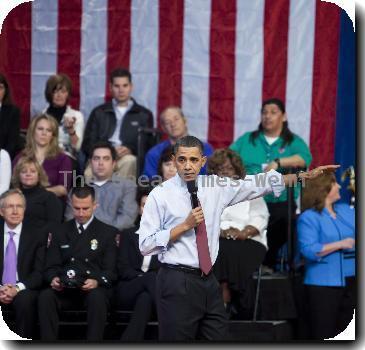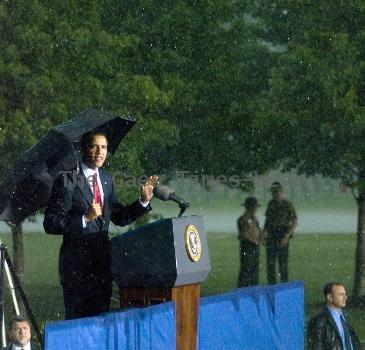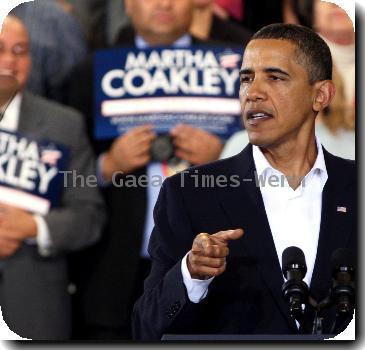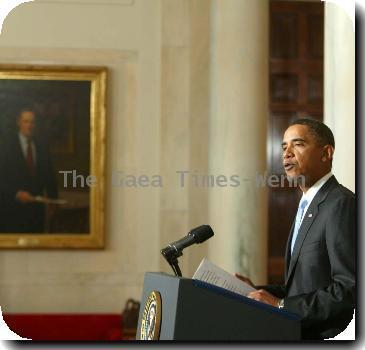Editorial Roundup: Excerpts From Recent Editorials in Newspapers in the US and Abroad
By APWednesday, January 20, 2010
Editorial Roundup: Excerpts From Recent Editorials
Excerpts from recent editorials in newspapers in the United States and abroad:
Sept. 7
The Pueblo (Colo.) Chieftain on how federal health care legislation:
America is graying due to lower birthrates after the baby boomers came to be.
That means relatively fewer people will be paying taxes to support older Americans on Social Security and Medicare. And Medicare in particular is a ticking time bomb.
One portion of ObamaCare calls for “reducing the deficit” by cutting payments by 21 percent to doctors and hospitals under Medicare. But cutting money for Medicare just as more and more people are eligible would end up cutting available care for seniors just when they need it the most.
Under the legislation, the growth of those payments would be arbitrarily limited, so the cut would be bigger and bigger over time. This would cause havoc in health care for America’s seniors. Many medical practitioners are considering dropping Medicare patients because treating them would actually be costing more than the reimbursements.
Medicare already suffers an unfunded liability of $38 trillion, according to Medicare’s own government actuaries. What ObamaCare would do is loot $2.5 trillion from Medicare over the next 20 years to spend on other entitlements listed in the legislation. …
Only in Washington is massive spending incorrectly called the way to control costs. The American people have shown in poll after poll that they clearly understand that dichotomy, even as the ideologically driven congressional leadership refuses to listen to them.
Those leaders should remember that seniors are the most reliable group of Americans to vote. November is just a couple of months away.
Online:
chieftain.com
Sept. 8
Tulsa (Okla.) World on casualties of war:
The difficulties of fighting wars from Vietnam to Iraq to Afghanistan became evident again recently when NATO claimed an airstrike killed at least 12 insurgents while Afghanistan President Hamid Karzai said the victims were civilians.
It also again shows the weakness and corruption of the Afghan government.
Such headlines are an almost daily occurrence. Karzai needs the alliance to prop up his government. But he also needs to kowtow at times to the Taliban in order to keep his job, if not his head, after the U.S planned pullout next year.
Were the victims members of the Taliban — NATO says one was a Taliban commander — or were they campaign workers as Karzai claims? And therein lies one of the big problems in this sort of war. The enemy blends in with the civilians. And, tragically, too often civilians are caught in the crossfire.
There have been civilian casualties in all wars. Until Vietnam, however, soldiers dressed as soldiers. There were formations and lines. Civilians were rarely targeted — with Nazi Germany being a dark exception.
The U.S. military faces a growing problem in its military operations. Commanders in Afghanistan have issued orders for troops to minimize civilian casualties. Those doing the fighting, however, know that such caution can lead to casualties among their own comrades.
Further, as the U.S. learned in Iraq, for every innocent civilian killed, there is the potential to create more terrorists. Revenge is a strong motivator.
Secretary of Defense Robert Gates has promised an investigation. Karzai uses the incident for political gain. The Taliban uses it for recruitment. And it’s a good bet the same thing will happen again and again.
Online:
www.tulsaworld.com
Sept. 6
The Post and Courier of Charleston on misguided PACT legislation:
Washington should do all it reasonably can to protect our armed forces personnel from danger. But that shouldn’t include depriving combat troops of tobacco-product shipments.
Unfortunately, that’s exactly what military authorities are now doing due to strict new federal limitations on mailings of cigarettes, cigars and chewing tobacco to America’s military members. That’s a misguided result of the Prevent All Cigarette Trafficking Act legislation signed into law by President Barack Obama in March. …
House Armed Services Committee member Duncan Hunter, R-Calif., a former Marine captain who served in Iraq and Afghanistan, has introduced a bill aimed at removing that galling restriction for front-line personnel. His office stressed that his legislation is designed for “troops stationed at combat outposts who don’t have the luxury of stepping off the battlefield to buy a pack of cigarettes.”
The Pentagon should continue to discourage smoking and chewing tobacco, and to offer assistance to troops who want to quit. But the brave Americans who decided to enlist in our all-volunteer armed forces ultimately should be allowed to make their own tobacco-use decisions. And if they decide they want to relieve some of the incredible stress they face by using tobacco, that should be their call.
Depriving our military men and women risking their lives in combat zones of tobacco shipments from home isn’t just absurd and insulting.
It’s ungrateful.
Online:
www.postandcourier.com
Sept. 3
The Intelligencer, Wheeling, W.Va., on the new Medicare and Medicaid administrator:
Before President Barack Obama selected him to administer the Medicare and Medicaid programs, Dr. Donald Berwick headed the Institute for Healthcare Improvement, a nonprofit “think tank.” Berwick co-founded the institute and helped raise money for it.
While there, Berwick’s compensation package reportedly was in the $900,000 range. He had a seven-figure retirement plan.
Now, Berwick is telling members of Congress he is not at liberty to divulge sources of funding for the institute.
That is not acceptable. It is known that some major health care and insurance companies donated to the institute. Some stand to reap enormous additional profits, depending on Berwick’s decisions as head of Medicare and Medicaid. Even if no direct conflict of interest exists, Americans are entitled to know more about links between Berwick’s new job and those who generously funded his old one.
Online:
theintelligencer.net
Aug. 29
The New York Post on the Obama Administration and the economy:
Summer of recovery? Not quite.
The Obama administration, with Vice President Joe Biden playing head cheerleader, has been pushing the idea that last year’s $862 billion stimulus, the linchpin of the administration’s economic plan, worked and the economy is rebounding. Far from it.
Indeed, things look to be worsening.
The unemployment rate is stuck at 9.6 percent, though the stimulus was supposed to keep unemployment below 8 percent.
Meanwhile, sales of new homes in July plunged 12.4 percent from June — to a level not seen since such records were first kept nearly 50 years ago — and purchases of existing home sales dropped 27 percent, to a 15-year low.
The chief reason? The expiration of a temporary tax break for home buyers.
Clearly, the administration’s scattershot economic policy doesn’t work.
Yes, the economy was in rough shape when the Obama team came in; things weren’t going to change overnight.
But there’s no reason to accept the inevitability of a double-dip recession, either — though that seems on tap.
Thirty years ago, Ronald Reagan took office facing a dire economic landscape — a different crisis, yes, but with similar nationwide anxiety.
His “fix” was relatively simple — restore confidence by squeezing inflation and cutting taxes broadly. …
Clearly, Barack Obama is no Ronald Reagan.
Online:
www.nypost.com
Sept. 7
MetroWest Daily News, Framingham, Mass., on a contemporary Labor Day:
Americans are an industrious people. They like to work. And they are unhappy when they can’t — as shown with the unrest over the current 9 percent-plus unemployment, a rate many countries would take in a second.
The habits of work are deeply ingrained in our national DNA, as this Labor Day reflection by the U.S. Census Bureau shows.
In a nation of 310 million people, some 154.4 million of us 16 or older are in the work force. There are 7.6 million who like to work so much — or have to — that they hold more than one job. Most of what the Census calls “moonlighters” have a second part-time job. But there are 284,000 people out there who work two full-time jobs. We salute them, but we’re not inclined to emulate them.
There are 10.1 million who work for that most demanding of bosses — themselves. They are the nation’s self-employed. And for all the talk of telecommuting, only 5.9 million Americans work at home.
While the 40-hour work week is pretty much standard, over a quarter — 27 percent — work longer and 7 percent work 60 or more hours a week.
Although Labor Day is a gift to us from the labor movement, credit generally goes to the Carpenters and Joiners’ Union for a workers’ parade in New York City in 1882. There are now only 16.1 million union members, about 12 percent of wage and salary members.
Despite the long-running campaign to get Americans out of their cars, 76 percent of us drive to work alone. And 13 percent of all commuters, 17.7 million hardy souls, leave for work between midnight and 5:59 a.m. If you’re leaving for work at that hour, do try to be quiet about it.
Online:
www.metrowestdailynews.com
Sept. 6
The Seattle Times on young voters:
Come out, come out wherever you are. Experts predict younger voters, those pumped up, enthusiastic Millennials age 18 to 24 who helped propel President Barack Obama to victory, will not participate so much in the 2010 midterm elections.
That is both predictable and a shame. Economic issues pressing down on every age group directly affect younger voters. Just ask college students who arrive at graduation with high hopes and anticipation only to discover jobs are not there. Quite the contrary. Many highly qualified candidates are finding it difficult to even get a response to a lengthy application, much less land the elusive job.
The 2008 election was the first time since 1992 that a majority of voters ages 18 to 29 turned out, says the nonpartisan Center for Information & Research on Civic Learning & Engagement, CIRCLE. …
Do not assume students in 2010 will vote the same way they did two years ago. In 2008, exit polls showed Obama drew two-thirds of voters under 30, while getting 45 percent of voters 65 and older. But polls show some drop-off in support for Democrats among younger voters as they face disappointment that many promising economic-recovery ideas have not yet panned out.
The point, however, is voting should be part of one’s routine and ongoing civic responsibility. Younger voters have much to lose by not taking part.
Online:
seattletimes.com
Sept. 6
Chicago Tribune on defense spending cuts:
Here’s how you know if a diet is a genuine program for weight loss: It involves some unpleasant sacrifices that you will lament.
Here’s how you know if a government spending plan is serious rather than superficial: It inflicts squeals of pain that you can hear.
Count Defense Secretary Robert Gates in the serious camp. When he announced plans to close the Joint Forces Command in Norfolk, Va., as a cost-saving measure, he drew angry protests from the state’s representatives in Congress.
Gates has a good idea. The JFC employs some 2,800 people, military and civilian, as well as 3,000 private contractors, at an annual cost of $240 million — all for the purpose of making sure that the four military services operate in cooperation rather than as individual entities. That was once a challenge, but Gates attests that today, the services have “embraced jointness as a matter of culture and practice.”
Having done its job, the command is no longer needed. How’s that for an innovative approach to federal spending? …
This step is just one part of Gates’ effort to trim the size of the Pentagon, which is clearly overdue. He wants to slash spending on contractors by 30 percent, reduce the number of generals and admirals from 950 to 800, and freeze hiring in his own Office of the Secretary of Defense. …
The effort is partly a matter of simple common sense. It’s also meant to head off less careful and more drastic cuts that Gates fears may come as a result of the intense budget pressures brought on by the recession. He doesn’t want to reduce overall spending, but rather to shift outlays to weapons and other hardware. …
The fight Gates is undertaking will not be easy, and it will not make him a lot of friends. Those are signs he’s on the right track.
Just listen to the squeals.
Online:
www.chicagotribune.com
Aug. 31
The Calgary Herald, Alberta, on global warming:
We’re all for corporate social responsibility, but we wonder if Walgreens, The Gap, Levi Strauss and Timberland are aware that they may be contributing to global warming by joining the naive Forest Ethics boycott of fuel derived from Alberta’s oilsands.
According to a study released by Barr Engineering of Minneapolis for the National Petrochemical and Refiners Association in August, the implementation of a low-carbon fuel standard in the U.S. would increase global greenhouse gas emissions by up to 19 million metric tons because it would force U.S. refiners to import more oil in tankers from the Middle East, Venezuela and elsewhere.
It would also force Alberta to seek markets in India, China and other Asian nations. The study says the result of this global “shuffle” of oil via tankers across thousands of miles of oceans would cause higher carbon dioxide emissions than by simply extracting Canadian oil at its source. …
Executives eager to portray their corporations as green need to examine the unintended consequences of their decisions and be reminded that global warming respects no borders. …
But the leaders of these companies know that it is possible to improve practices, as The Gap demonstrated after settling a $20 million class-action lawsuit with workers in Asian sweatshops in 2003.
The company resolved those alleged abuses, just as the research and development arms of oilsands companies are feverishly working to improve extraction techniques in Alberta — which is more than can be said of the dubious, unfriendly nations to which America will increasingly turn for its oil if the Alberta spigot is turned off.
Online:
www.calgaryherald.com
Sept. 8
The Jerusalem Post on Israel maintaining military superiority for regional peace:
It emerged recently that during his low-key visit to these parts at the end of August, Yukiya Amano, head of the International Atomic Energy Agency, asked Israel to consider signing the Nuclear Non-Proliferation Treaty.
This was the latest chapter in an ongoing campaign, fueled primarily by Egypt, other Arab states, and Iran, to force Israel to commit itself to a nuclear-free Middle East.
Israel is the only country in the region that purportedly has nuclear warheads.
Arab countries scored a major victory with May’s NPT Review Conference resolution, which ignored Iran’s refusal to cooperate with the IAEA while singling out Israel for censure, though the U.S. communicated important clarifications to Israel ensuring that Israel would not be forced to change its policy. …
Israel has pledged not to be the first to introduce the use of nuclear arms in this region, and has demonstrated responsibility and restraint for decades. That should be enough.
Neither Israel nor the democracies of the world that value freedom can afford to change the status quo at a time when all energies must be directed against Iran’s push to obtain nuclear weapons. …
The Islamic Republic is also working to undermine the fragile stability achieved by US forces in Iraq.
In this geopolitical reality, Israel must maintain uncontested military superiority for the sake of regional peace.
Iran cannot be allowed to upset the balance of power. …
Online:
www.jpost.com
Sept. 4
The Asahi Shimbun, Tokyo, on India’s non-nuclear diplomacy:
Fast-growing India will become a major nuclear energy user in the near future. Its market is said to be worth tens of trillions of yen.
India’s introduction of nuclear energy is also expected to work in favor of stemming global warming. Under such circumstances, Japan embarked on negotiations to conclude an atomic energy cooperation agreement with India, which became a nuclear power without joining the Nuclear Nonproliferation Treaty.
The United States, France and Russia have already signed agreements with India and are talking business. However, if Japan, which attaches importance to its non-nuclear diplomacy, also moves toward concluding an agreement with India, international trust for the NPT could grow even weaker than it is.
Such strong apprehensions are spreading both at home and abroad.
How can Japan strike a balance between economic cooperation and non-nuclear diplomacy? Foreign Minister Katsuya Okada, who visited India in late August, presented a principle.
During his meeting with his Indian counterpart, Okada said, “In the event India conducts a nuclear test, Japan has no choice but to stop atomic energy cooperation.” He also showed Japan’s posture to closely watch India’s efforts toward nuclear disarmament and nonproliferation, including the signing and ratification of the Comprehensive Test Ban Treaty at an early stage. …
An expert on nuclear issues at a private U.S. think tank had high expectations for Japan. The expert urged Japan to make use of its many types of nuclear-related equipment that India needs as leverage to demand an effective agreement that Japan wants. …
Online:
www.asahi.com
Sept. 2
London Evening Standard on new Middle East peace talks:
The Middle East peace talks — that is, the latest installment — have begun in a flurry of activity and anxious speculation about the body language of the two main participants, Israel’s Benjamin Netanyahu and the Palestinian President Mahmoud Abbas. But the truth is that these talks will be a long-running story; they could take at least a year, given the sheer complexity of the issues. Optimists will take heart from the new impetus given to the peace process by the formidable combined focus of President Barack Obama and U.S. Secretary of State Hillary Clinton.
But there are serious grounds for concern about the chances of success … Holding discussions between Israelis and Palestinians in the absence of Hamas, the elected government of Gaza but repudiated by Western governments as a terrorist organisation, is a partial endeavor. Has Abbas the authority to broker this deal? …
The Israelis, for their part, placed the talks in jeopardy at the start by announcing that they do not intend to renew the temporary ban on illegal settlements in the occupied territories. This may be simply a negotiating gambit but it ignores the reality that giving up the settlements is a necessary precursor for any agreement.
Then there is the question of Jerusalem: both sides would like it for their capital. The truth is that this city is sacred to three faiths and two peoples.
It is positive that Obama is engaging with this thorniest of problems: he is in this for the long haul. He will need to be.
Online:
www.thisislondon.co.uk
Tags: 2010 Fifa World Cup, 2010 United States Census, Accidents, Afghanistan, Africa, African-americans, Agricultural Sector Performance, Air Quality, Air Traffic Control, Air Travel, Alabama, Alberta, Argentina, Arizona, Arts And Entertainment, Asia, Asif Ali Zardari, Athens, Australia, Australia And Oceania, Barack Obama, Beijing, Bill Clinton, Biology, Blockades, Bombings, British Columbia, Buenos Aires, California, Cambodia, Campaigns, Canada, Caribbean, Censuses, Central America, Central Asia, Child And Teen Health, Children's Entertainment, Chile, China, Class Conflicts, Climate, Coastlines And Beaches, Collateral Damage, Colorado, Computer Crime, Computing And Information Technology, Connecticut, Consumer Electronics, Corporate Crime, Corporate Ethics, Criminal Investigations, Cuba, Debt And Bond Markets, Defense Policy, Demographics, Developmental Disorders, Diseases And Conditions, District Of Columbia, Dividends, Doping, Doping Regulations, Drug-related Crime, East Africa, East Asia, Eastern Europe, Edward Kennedy, Emergency Management, Energy, Energy And Fuel Technology, Energy And The Environment, England, Environmental Concerns, Environmental Laws And Regulations, Epidemics, Europe, Evan bayh, Events, Expo 2010 Shanghai China, Falkland Islands, Fifa, Filibusters, Floods, Foreclosure Rates, Foreign Aid, Foreign Policy, Freedom Of The Press, Gaza Strip, Generations, Geography, Germany, Government Pay, Government Pensions And Social Security, Government Programs, Government Regulations, Government-funded Health Insurance, Greater China, Greece, Green Technology, Haiti, Health Care Costs, Health Care Reform, Health Issues, High School Sports, Hillary Clinton, Hispanics, Home Buying, Huntsville, Immigration Policy, Immunizations, Improvised Explosives, India, Industry Regulation, Infectious Diseases, International Agreements, International Soccer, International Trade, Ipad, Iran, Iraq, Israel, Japan, Jerusalem, Joe biden, Judicial Appointments And Nominations, June 2, Labor Economy, Labor Issues, Latin America And Caribbean, Lebanon, Lee Myung-bak, Liberia, London, Louisiana, Luxury Shopping, Massachusetts, Materials, Mexico, Middle East, Military Affairs, Mississippi, Missouri, Mountains, Municipal Governments, Music, Natchez, National Courts, New Orleans, New York, New York City, North America, North Carolina, North Korea, Northern Ireland, Nuclear Proliferation, Nuclear Weapons, Nutrition, Oceans, Ontario, Osaka, Ownership Changes, Pakistan, Palestinian Territories, Pennsylvania, Personal Finance, Personal Insurance, Personal Investing, Personnel, Political Corruption, Political Fundraising, Political Issues, Political Organizations, Political Scandals, Pork Barrel Spending, Prices, Products And Services, Professional Baseball, Protests And Demonstrations, Public Health, Pyongyang, Race And Ethnicity, Real Estate, Recessions And Depressions, Religious Issues, Residential Real Estate, Rhode Island, Romania, Russia, San Francisco, Saudi Arabia, Seattle, Senate Elections, Seniors, Seniors' Health, Seoul, Sex In Society, Shanghai, Shopping, Software, Somalia, South Africa, South America, South Asia, South Carolina, South Korea, Southeast Asia, Southern Africa, Spain, Sports, Stanley mcchrystal, Summits, Technology Issues, Technology Law And Ethics, Tel Aviv, Territorial Disputes, Terrorism, Tokyo, Toronto, Transportation, Transportation Safety, Turkey, United Kingdom, United States, United States Census, Utilities, Vancouver, Vietnam, Violent Crime, Washington, Waste Management, Water Environment, Weapons Administration, Weapons Of Mass Destruction, West Africa, Western Europe, Wetlands, Winter Olympic Games, Winter olympics, World cup























